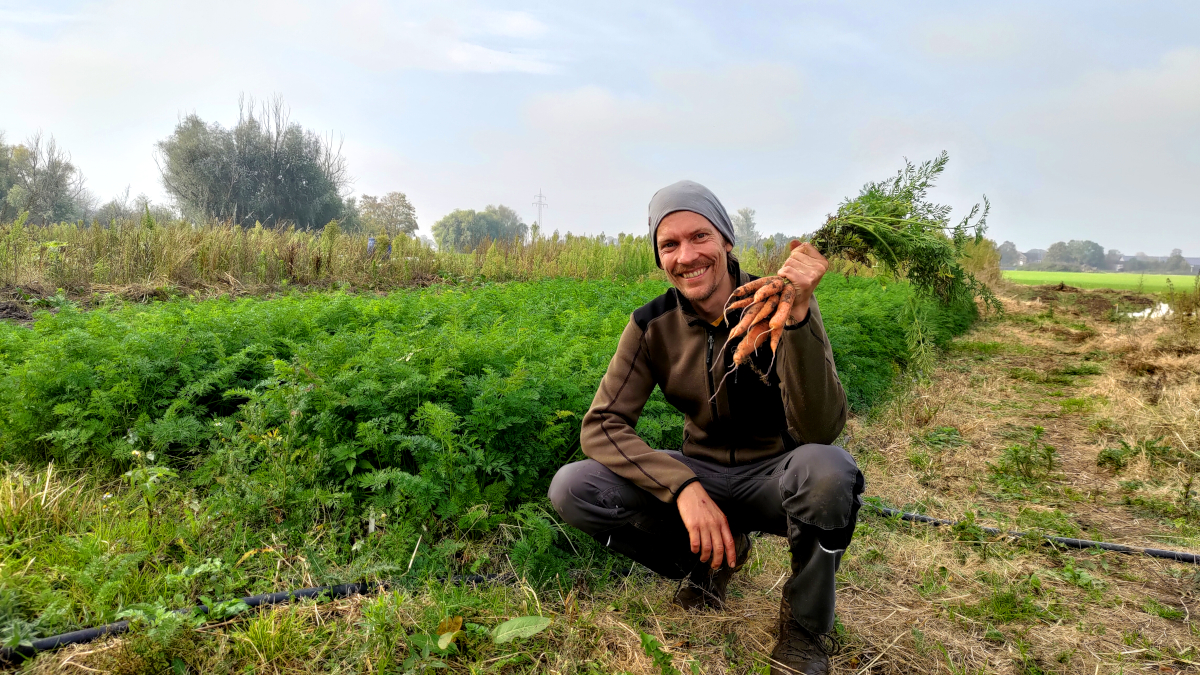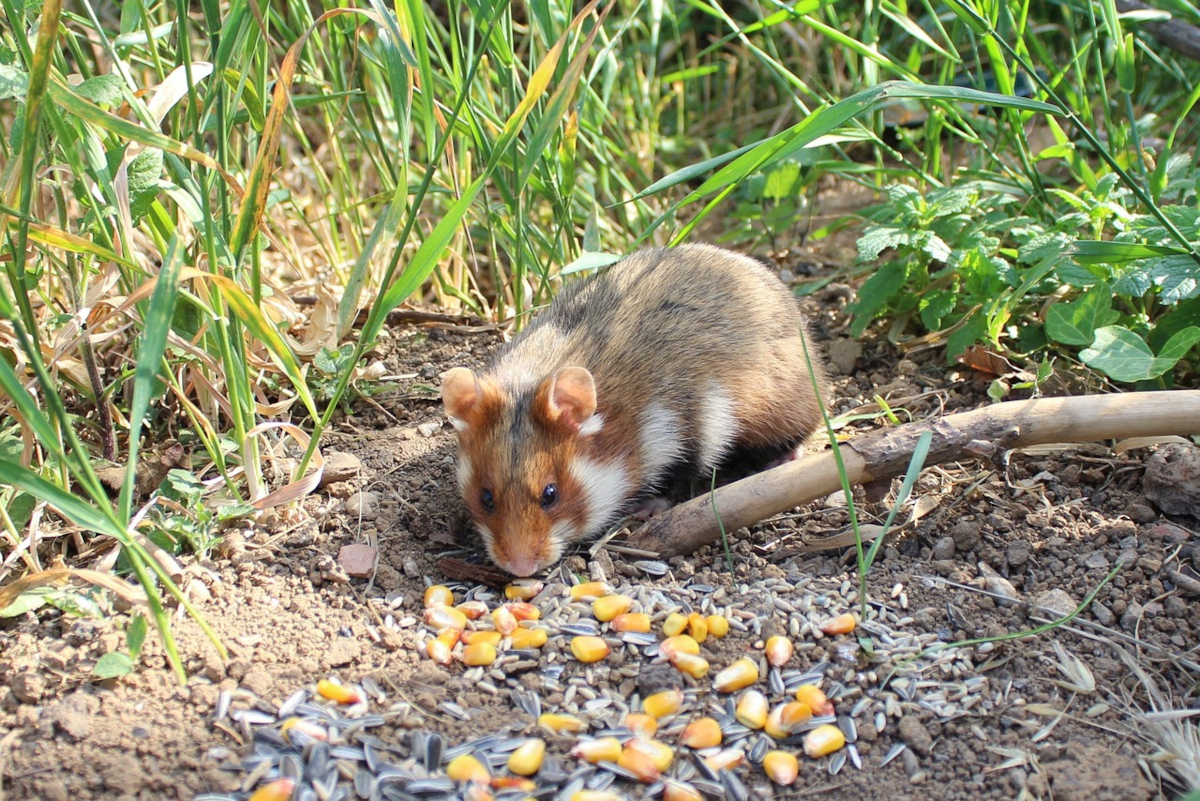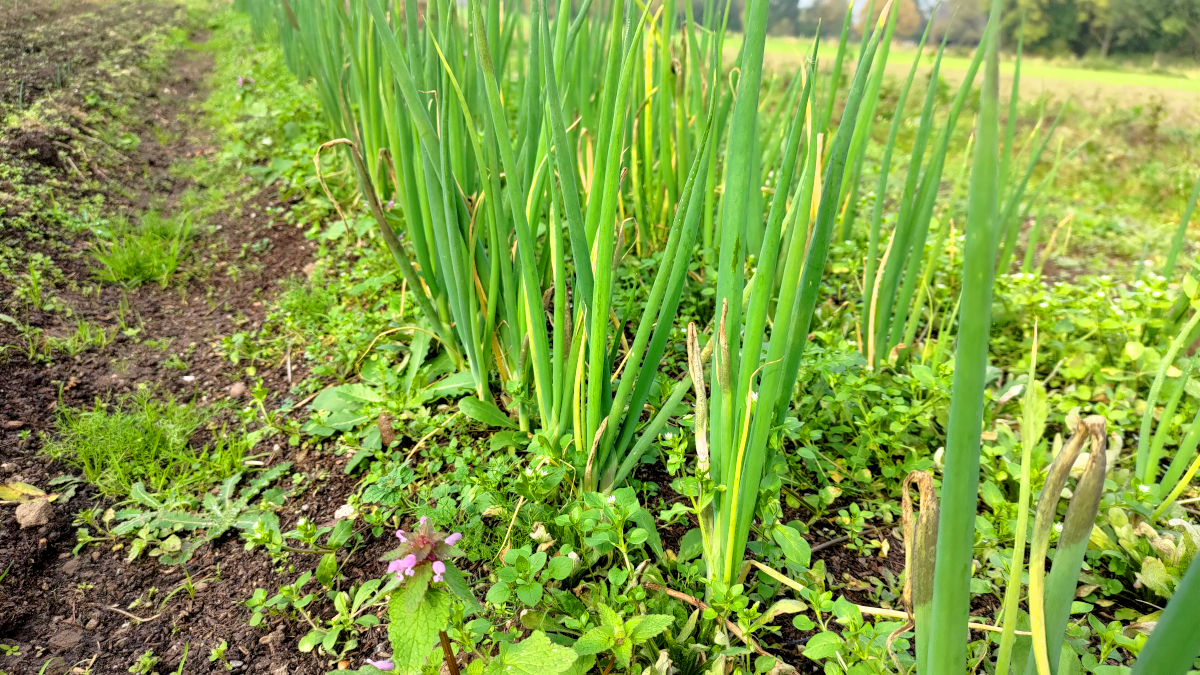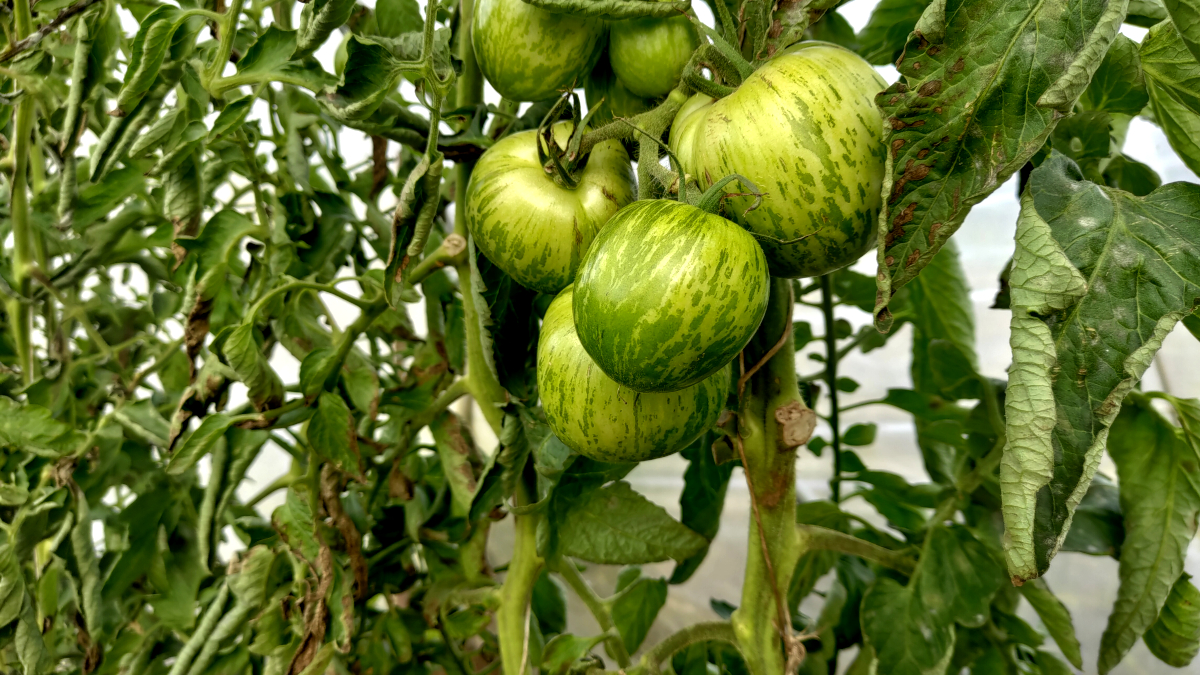Interview with Andreas Münnig from the association Solidarische Landwirtschaft Kleve e.V.

Andreas Münnig from the association 'Solidarische Landwirtschaft Kleve e.V.'
The interview took place on 01.11.2024 in the association's greenhouse
The association 'Solidarische Landwirtschaft Kleve e.V.', or Solawi-Kleve for short, was founded in early 2024 with the aim of producing sustainable, organic and healthy food.
Solidarity-based farming is a way of farming in which the food produced is sold directly to consumers who have come together to form a community and jointly finance a farm with their membership fees and receive the harvest in return.
Below you will find the interview with vegetable farmer Andreas Münnig, one of the founders of Solawi Kleve. The questions were asked by Lars Mühling from Aspermühle.
Lars Aspermühle: Who are you? Tell us a bit about yourself?
Andreas Münnig: I'm originally from Bochum, where I grew up, and I didn't actually originally come from the agricultural sector. I completed a technical degree in mechatronics there. When I finished, I didn't want to apply for a job in industry. I was involved in automation during my studies, which I thought was cool, but it destroyed jobs and that wasn't what I wanted or what I wanted to work towards.
Then I first traveled to Australia and did some work and travel there and visited some communities and eco-villages and helped out a lot. Among other things, I also worked in solidarity farming. That's where I gained my first experience in gardening.
I also had my own allotment garden during my studies, where I experimented for a few years and tried to be self-sufficient. So the subject had always appealed to me and interested me. That's why it was a good fit. I also just had the idea that I would like to live in a community.
Maybe on a farm, with lots of land around it and agriculture. So I thought about helping out on farms to see what it was like. Those were actually the best times and I really enjoyed it. It developed steadily and when I was settled after my travels in Germany, I looked around for projects to get even deeper into the subject, for example through workshops and courses.
Later, I saw that the university in Kleve offered a degree course in sustainable agriculture and I decided to start studying again. I first commuted from Bochum to Kleve and then later moved here to Kleve.
Lars Aspermühle: That must have been a culture shock?
Andreas Münnig: At first the culture shock was moving back to the city after traveling to Bochum, as I had previously been in the countryside. Moving back to a rural region was then easier.
Lars Aspermühle: Have you run any other projects of this kind?
Andreas Münnig: Yes, when I was already living here in Kleve, I had heard through a fellow student that they were looking for a young gardener on a farm in Uedem. They were interested in working with me and then I farmed there for two years.
That's when I first came into contact with market gardening, which is a technique or a different approach to farming.
Aspermühle's comment:
Market gardening describes the resource-conserving cultivation of food, mainly vegetables, on as small an area as possible. The aim here is to work the soil as gently as possible, to build up the soil naturally and to do without artificial fertilizers or pesticides. This inevitably goes hand in hand with not using large machines to prevent soil compaction, natural green and compost fertilization and natural weed and pest control. For example, beneficial insects such as ladybugs, lacewings and runner ducks are used, and weeds and snails are removed by hand. Hedgehogs are also very helpful.
In addition, attempts are made to extend cultivation to the whole season where possible and to sell directly to the consumer.
So community-supported agriculture and market gardening go hand in hand.
Andreas Münnig: Those were my first touches with it and I also had quite a good yield. In the second year, I tried to sell my vegetables at the market in Xanten. I had full vegetable crates there, but unfortunately there were no customers and therefore no sales. There were a few people who were enthusiastic, but unfortunately there were too few overall.
Lars Aspermühle: Were the vegetables organic quality?
Andreas Münnig: I didn't use any chemicals, so it was theoretically organic produce, but it wasn't declared as such.
Lars Aspermühle: Were there too few customers in general or because customers tended to buy from the supermarket?
Andreas Münnig: It may be that I should have been even more patient, that the customer base would have established itself, but there were also too few customers overall.
I could also have done more advertising. That wasn't enough at the time. And I could have made the market stall even more attractive overall. At the time, we only set up the tables with the vegetable crates on them. So everything was kept relatively simple. You could certainly have done a bit more, for example put up boards explaining the business. That would have looked a bit more appealing.
Lars Aspermühle: So that people know what's behind it.
Andreas Münnig: Exactly, that wasn't so well done by at the time. It was also two very exhausting years. In hindsight, it could have been done differently and better. But it also made me think about what exactly could have been done better. After two years in Uedem, I took a two-year break from farming and was able to think about things during that time.
During this time, I started a job in the technical field and realized that this was not what I wanted to do. Although I also find it very interesting because it's a passion of mine, but not in the environment where I was working.
Lars Aspermühle: What is the founding background of Solawi-Kleve?/ How did you or did you come up with the idea of establishing solidarity agriculture here?
Andreas Münnig: I let the thoughts I had about farming sink in and then spoke to a friend from Kleve who had already worked and participated in another Solawi. She said she knew a farmer who also wanted to work with a community-supported farm, but didn't want to set one up himself, but was more interested in joining a cooperative.
Lars Aspermühle: And that was then already the idea of solidarity farming?
Andreas Münnig: Yes, I already had that thought and my friend then put me in touch with Hendrik van Aken from Hof Berkhöfel. I called him and he was immediately taken with the idea.
I then invited various people and spread the word that we wanted to set up a Solawi and were still looking for members. We then held an event where around 10 people attended. I had previously spread the word via my circle of friends, WhatsApp groups and social media.
Lars Aspermühle: Also among the students in Kleve?
Andreas Münnig: Yes, I also shared it in student groups. So quite a few people came together. It was a cool group and then we started planning last year in the fall and met regularly once a week and then founded the association "Solidarische Landwirtschaft Kleve e.V." in January 2024.
In the following video, the principle of a Solawi is explained once again using the example of Solidarische Landwirtschaft Bamberg.
Lars Aspermühle: Where do you grow your vegetables?
Andreas Münnig: At the beginning we had another area in mind than the current one, which was quite small, but it was difficult to find alternatives. Then I asked the city of Kleve and they said they might have something else, but couldn't say anything more specific at the time and we waited a long time. Then I started on the other area and in the meantime I got the message from the city of Kleve that they had an area for us. We then took a look at it and it was a very good fit because there were a few points that we had to criticize.
Lars Aspermühle: This is the space where we are now?
Andreas Münnig: Yes exactly, this is the area where we are now. There are certainly more optimal spaces, but overall it's already very good here. The location is very central, which is good for me because I live nearby. You can always set up a pick-up point for members who live further away, but if the farmer has to travel an hour to get to the field, he doesn't have a good overview of the whole situation. So I quickly drive to the field and check that everything is in order. Fun.
So we had signed the contract with the town of Kleve. It was quite late in the year, in April, and of course we wanted to start straight away, but unfortunately that wasn't possible due to the humidity. It had rained so much that we couldn't even prepare the field and work on it for a day at first.
It was freshly plowed, but we had to at least drive over it with a power harrow to smooth it out so that we could create beds.
Lars Aspermühle: How do you prepare the fields? With agricultural machinery or do you do it by hand?
Andreas Münnig: Yes, we do everything by hand. There was once a preparation with the power harrow, by Hendrik from the Berkhöfel farm. He smoothed everything once and prepared it for us, but now we do everything without machines and by hand.
Lars Aspermühle: Then you probably don't have the problem with soil compaction?
Andreas Münnig: Exactly, soil comp action is one issue we wanted to avoid. We are also aiming for independence from fossil fuels.
Lars Aspermühle: With plowing, surely another issue is that the field hamster is dying out?

fieldhamster
Andreas Münnig: Yes, if you do all the work with a tractor, it's very efficient and essential for large areas, but if you want to be a bit closer to the plants, then you don't have to do it with a tractor. You can only see the field from several meters away.
Lars Aspermühle: It's also important how much time you can and want to invest. Perhaps this is also slightly different for organic products than for conventional products?
Andreas Münnig: It's not a question of organic or conventional farming, but it's definitely a different approach to farming. However, with some products, such as cereals, it is of course difficult to work purely by hand. In theory, you could of course also work with a scythe. But I'm not that familiar with cereal cultivation. With mechanical processing, you are also dependent on which plant varieties can be processed with the machine and that is often a disadvantage for healthy plants. The choice is very limited.
Lars Aspermühle: In addition, a field should not only contain monocultures, but a healthy mix of plants, which are then not suitable for machine harvesting.
Andreas Münnig: That is an important point. Take garlic, for example. There are varieties with a hard stem and varieties with a soft stem. For mechanical processing, only the varieties with a soft stem are suitable, which can also grow upwards if the machine inserts the garlic cloves the wrong way round. But we can also use other varieties that have a firm stem, for example, because we can plant them by hand and therefore pay close attention to how they are inserted. A machine can't do that and doesn't know where the top and bottom are. There are also good garlic varieties that have a soft stem, so-called "soft neck" varieties, but the "hard neck" varieties tend to be the more aromatic and healthier ones.

Garlic plants in the Solawi field
Lars Aspermühle: You just said "we". Who are we and how many members do you currently have?
Andreas Münnig: We are the "Solidarische Landwirtschaft Kleve" association and have just under 20 harvest shares.
Lars Aspermühle: 20 harvest shares means 20 members?
Andreas Münnig: Yes, exactly. There are just 21 members because we also distribute half shares. That's why there are different numbers of harvest shares and members. Some also have more than one harvest share.
Lars Aspermühle: How does that break down? What is the difference between a half and a full harvest share? What do you get from the harvest as a member?
Andreas Münnig: It's simply a difference in quantity. We weigh or count the harvested products and then calculate the harvest shares. For example, if we have 20 kg of tomatoes and 20 shares, then each harvest share gets 1 kg. And if you have half a share, you only get 0.5 kg.
This allows you to decide whether you have a high demand for vegetables and need a whole harvest share. We calculate that one share should be enough for one or two people. Half a share is roughly enough for one person. That's the theory, but it's always difficult to plan.
Lars Aspermühle: Do all members help out in the field or are there also members who just pay a contribution and get their share of vegetables or can anyone join in and can you become a member without helping out?
Andreas Münnig: We have no obligation to help. There are other solidarity farms that are organized differently and have different rules. There is a compulsory obligation to help out for at least 12 or 24 hours a year, because otherwise the concept doesn't work. We decided from the outset that we didn't want any restrictions and didn't want to dictate to members that they had to help out.
Then we can offer people the opportunity to join the association, even if they don't have the time or are physically unable to do so. We didn't want to exclude anyone. We are also just at the beginning and are happy to reach the minimum number of members to make the whole thing economically viable. I want to give everyone who is interested and wants to support and be part of the whole thing the opportunity to do so. The person is welcome to join for all I care.
Lars Aspermühle: How would someone participate if they are physically limited and can't work in the field?
Andreas Münnig: First of all, members are just asked to help out. We invite people to an action day once a month, where you can come if you can and want to, but it's not compulsory. When it's harvest time, I also write to people to see if they can help.
Lars Aspermühle: These are all members then?
Andreas Münnig: Those are the club members then. This year we've also taken on a mini-jobber to support us.
Lars Aspermühle: That's a permanent employee then?
Andreas Münnig: Yes, it is a permanent employment relationship.
Lars Aspermühle: What's it like for you? Are you here quite a lot? Is that paid?
Andreas Münnig: There are different models of solidarity farming. In our case, we have the association and I also have my own farm. There is a cooperation agreement between the association and the farm and the association has commissioned me to farm on its leased land.
Lars Aspermühle: So you are effectively employed externally for the association?
Andreas Münnig: No, I have my own farm and that's where the mini-jobber is employed and I have a contract with the association to grow vegetables on their land.
Lars Aspermühle: So you're not employed directly by the association, but the association contracts your company.
Andreas Münnig: Yes, exactly. I invoice the association. The amount is then determined at the beginning of the year.
Lars Aspermühle: So that also gives you planning security?
Andreas Münnig: Exactly, that's also the big advantage for farmers in a solidarity-based farming system, that you have a fixed base of customers and are paid regularly via the membership fees.
Lars Aspermühle: By members buying fixed quantities of vegetables, is it then already clear at the beginning of the year what you have to grow and what quantities are needed and can then plan?
Andreas Münnig: Yes, I can just explain the principle of community-supported agriculture again.
There are different models of community-supported agriculture, usually an association or a cooperative. Its members commit to paying a membership fee for a year, i.e. for one harvest season, and in return they receive the harvest that a farmer grows. Everything is planned at the beginning of the season. What and how much will be grown and at what time, how much it will cost, how much effort is involved and what equipment is needed. All of this is listed. Then we know what budget we need at the beginning of the season. This is divided up among the members or harvest shares.
Lars Aspermühle: Are you automatically a member if you are a vegetable buyer?
Andreas Münnig: Yes, the people who get the vegetables are all members.
Lars Aspermühle: But there is also a kind of trial subscription?
Andreas Münnig: That was a special case. Actually, only the members get the vegetables, but in order to give other people an understanding of community-supported agriculture who have not yet had any contact with it and are not yet familiar with it, we also want to give these people the opportunity to get a taste of it, join in for a few weeks and see how it works. Perhaps also to get to know the other members better. To this end, we have included the trial subscription in the program.
You can use the trial subscription for one month, or longer if required and available. A few people have already signed up and our capacities are currently exhausted. It only works as long as there are surplus vegetables available. And because we still had capacity, we were able to offer this.
Otherwise, you can register as a member from the 2025 season. You can actually come to the field at any time, but as we're not here every day, it's best to visit us on the website www.solawi-kleve.de. There you can have a look, get information and write to me. Of course, it's best to meet in person, as the subject matter is very extensive and people can also take the opportunity to see the field directly.
Lars Aspermühle: It's also nice to know where the vegetables come from and who the people behind them are.
Andreas Münnig: To come back to the explanation of solidarity agriculture.
At the beginning of the year, as I said, the required budget is calculated and divided up among the members.
But you also have the option - we didn't do this this year, but we'll probably do it next year - of holding a so-called bidding round.
Lars Aspermühle: What is that?
Andreas Münnig: It's an instrument to make the matter even more solidary. It's supposed to be solidarity-based agriculture.
Lars Aspermühle: I could imagine that they are looking at who earns more and perhaps wants to pay more than someone who is a student, for example, and doesn't earn as much. (How high is the membership fee?)
Andreas Münnig: Yes, exactly. If you work out that we need €70.00 from each member and then all the costs would be covered, we would hold a bidding round and if there are people who could afford to pay a little more, they could pay €80.00 per harvest share, for example, and another person who earns a little less can only pay €60.00 in return.
Lars Aspermühle: That's a good idea. For example, if you go into a store at the moment, everyone pays the same, no matter what they earn. At the moment, you pay €8.00 for a kilo of tomatoes in an organic store and €12.00 for the small tomatoes. That's not cheap if you're on a student budget.
Andreas Münnig: Exactly, and that way you can make the contribution a bit variable. If a student says, for example, I can't afford this 70 euros, or at the moment it's 84 euros for us, per harvest share, but I could afford a 10 euro lower contribution for vegetables and then I would also participate, then the bidding round is an instrument to intervene in a controlled way.

Green tomato variety in the Solawi greenhouse
Andreas Münnig: Another instrument that can be used to make community-supported agriculture accessible to more people is participation.
We are still in the budget planning stage right now, so I don't know exactly what contributions it will amount to, but it will probably be
around 50 euros. You would get a whole harvest share with 50 euros, as long as you help out.
Then you would probably have to help out for about 24 hours a year, so on average 2 hours a month. That's not really much. You can also work these hours on 3 days in a row, for example, or you can help for 2 hours every month, or you can just work at the weekend.
Lars Aspermühle: Is there also less work, especially in winter?
Andreas Münnig: Yes, in this context I will also set up another calendar on our website where you can sign up and where I will announce where
is currently in need and when there are small timeslots to help out. People can then sign up there.
But if members don't have any time at all because they work a lot or can't for other reasons, then they have to pay a higher membership fee.
Around 17 euros per hour to get to 84 euros per month in the end.
You basically calculate what is missing in terms of manpower.
Lars Aspermühle: But what about if you have too many members who don't have time but still want vegetables? Would that be a problem
Andreas Münnig: Then it wouldn't really be a problem because people would pay more.
Lars Aspermühle: And then would you employ someone to do it?
Andreas Münnig: The members now pay 17 euros per hour of work and we would hire someone for that. Of course, that's also an option.
Of course, this has to be decided at the beginning and then, depending on how many hours we allocate, we can hire an additional assistant.
Lars Aspermühle: How does it work in the summer? There is always work to be done during this period.
You have to water or remove pests, for example, and surely someone always has to be on site?
Andreas Münnig: Yes, someone always has to be there.
I haven't had much vacation this year either. Especially at the beginning of the project.
We had our mini-jobber from July, but until then I was here all by myself and couldn't leave the field to its own devices.
In August, I took a week off. The mini-jobber
had just arrived and had already worked for a few weeks and gained experience. I was able to take a week off, but otherwise it just wasn't possible.
In the future, it would be nice if we could expand the agricultural team a bit to create more flexibility.
All the work is very strenuous and it's good if you can take a few days off and other people can take over the work.
It's certainly not possible at any time of year, but at least once in a while.